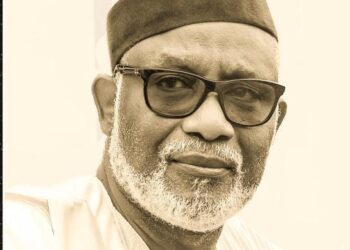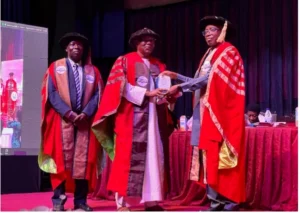
On August 8, 2024, the Nigerian Academy of Letters (NAL) bestowed its Honorary Fellowship (Hon. FNAL) on the foremost writer and culture enthusiast, Dr. Bukar Usman, at a ceremony held at the University of Lagos. In this interview, DENJA ABDULLAHI, a former President of the Association of Nigerian Authors (ANA), tells the award-winning poet Khalid Imam the significance of the highly coveted Fellowship in the light of Dr. Usman’s immense contributions to the arts and culture sector.
QUESTION: As a past President of the Association of Nigerian Authors, how do you receive the investiture of Dr. Bukar Usman as Honorary Fellow of the Nigerian Academy of Letters (Hon. FNAL) recently?
ANSWER: I saw it as well-deserved or even over-deserved, if there is anything like that. Dr Usman has made tremendous and prodigious contributions to the world of letters. His contributions are tangible, apparent and sustained over a long period of time. He has made the intangible of our cultural heritage tangible in his writings, researches and publications. For that he deserves all the honour and accolade that may be available to accord him.
Q.: Did you know Dr. Usman before your tenure as ANA President, and was he among the elderly statesmen ANA is proud to associate with while you served as President? And how do you perceive Dr. Usman’s contributions to Nigerian literature, especially literature in the indigenous languages?
A.: Actually, I knew him before I became the President of ANA when I stumbled on his books in Hausa and English which are folktales told in a modern short story form. I made some inquiries and I received cartons of the books from him, which I distributed to my colleagues at the National Council for Arts and Culture where I was working then. I remember approaching the then Director-General to suggest having Dr Usman as a keynote speaker in the then forthcoming National Festival for Arts and Culture (NAFEST) festival colloquium. Folklore, the foremost domain of Dr Usman’s works, is one of the cultural features which that organisation is mandated to promote.
When I became President of ANA, he was one of those elder statesmen who supported my tenure unflinchingly. He made several donations of books and even funds to several ANA conventions under my watch. He did all these unobtrusively.
The greatest contribution he has made through his large and impressive body of works is the safeguarding of our folkloric cultural heritage. The work he has done for our indigenous languages and literatures is enduring.
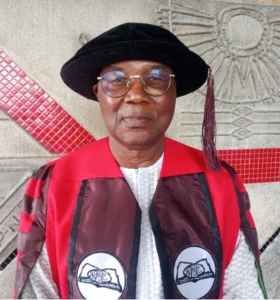
A.: Can you share any personal anecdotes or experiences working with Dr. Usman, particularly in his capacity as a generous literary supporter and books patron?
A.: One remarkable thing about him is the way he reaches you with his books when you ask for them and sometimes even without prompting. You will be in your office or somewhere and his staff will reach you, (saying) that he has a package for you, brought to you well-packaged, without fuss and without any cost to you.
Sometimes you wonder, what kind of man does this? When you open the package, you discover that you have received things to be treasured. He does his gifting in a self-effacing way, without the expectation of a verbal or written appreciation from you.
He has also supported a publication of mine when I reached out to him for support. There were also times when unsolicited support came from him and the most touching of this was when I lost my mom sometimes last year and a day after as I was heading home for the burial, I saw an alert on my phone of a substantial amount from somebody I could not decipher. I was not expecting anything from anyone as only a few persons were aware of my bereavement then. I racked my brain and called up a few friends to ask if they had sent me money and the reply was negative. Something suddenly came to my mind that it could only be Dr. Usman who could do this kind of thing. I sent him a message to thank him for his “quiet grace of generosity.”
I have relayed this not to open up his generous deeds done in private to the public but to foreground the fact that those who receive the generosity of others should not hide it or play politics with it. People do that a lot; they will not come up to own up that they have been recipients of someone’s goodness because of some false image they want to project or their positioning for present gains from other persons.
I have also directed other persons and institutions to go drink from Dr. Usman’s fountain of literary generosity. I will only here recount two incidents out of the many I have to tell. Recently, late last year, a university in Abuja was to host a major conference, they reached out to me for support and advice. I directed them to Dr Usman and they got the major donation to that conference from him in funding and literary materials. I did this without informing him and the institution was most grateful for the linkage I provided.
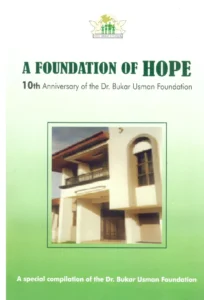
Also recently, a friend of mine, Dr Hassoum Ceesay, the Director-General of the National Centre of Arts and Culture in The Gambia, was in Nigeria for a study tour. He is an historian. We have maintained a long-standing friendship with him, inviting me to The Gambia two times in recent years. Of course, I go with loads of books for him anytime I go to The Gambia or send books across to him whenever anyone is going there from Nigeria. During this recent visit, he gave me money to shop for books for him, which I did.
The thought came to me as I delivered the bought books to his hotel that he needed to have Dr. Usman’s books. I sent a message to Dr. Usman as I left the hotel that someone from The Gambia would cherish his Treasury of Nigerian Tales Series.
Dr Usman called me up shortly after to verify and, voila!, before I got home my friend ecstatically called to inform me that he had received a load of books delivered by the great man himself.
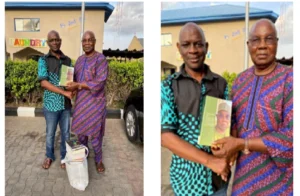
Q.: How do you think Dr. Usman’s financial contributions, participation in events, and book donations have benefited ANA and its chapters across the country?
A.: The benefits are great. I have only spoken from my own perspective. I wonder what other people have as stories in their relationships with Dr. Usman. I certainly know that the Dr. Bukar Usman Foundation has donated a lot to persons, schools, institutions and other worthy causes. You can find details of some of these contributions in A Foundation of Hope, the 10th Anniversary book published by the Foundation in 2020.
Dr. Usman is not the richest person in Nigeria but he has done a lot for literature and education in some sectors more than what even some government agencies with their bogus and ultimately stolen budgets have done in that same sector. The only other person comparable to Dr. Usman in the area of meaningful literary and educational philanthropy in Nigeria is Professor Yusuf Ali (SAN).
Q.: In what ways do you believe Dr. Usman’s efforts in preserving African folktales has enriched Nigerian literature and culture?
A.: Documentation of a disappearing and endangered cultural heritage is paramount to its safeguarding. The documentation effort of the Dr. Bukar Usman Foundation is a major effort at cultural preservation and promotion. Those books under the Treasury of Nigerian Tales Series and others are resource materials with which we can plot our culture to drive our future. We are in a digital age and creatives can use those already documented folktales to tell modern stories in dance, film, animation, theatre, poetry, drama etc.
Recently, the Nigerian digital world went crazy with the Gwo-gwo-gwo dance of the comedian Brain Jotter based on a folkloric song of an old singer, Sir Mike Ejeagha. The song itself is based on an Igbo folktale about the tortoise and the elephant. I am sure if you check the folktales collected in the Dr. Usman’s books you will find that same folktale documented there and many others across cultures involving the tortoise and the elephant as major characters.
So, it is left for the Nigerian creatives to delve into the documentation done by the Foundation to tell new tales about our unity, wisdom, technology, philosophy and prosperity.
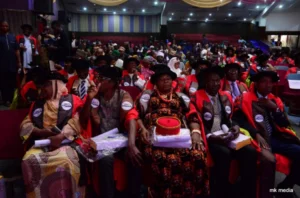
Q.: How does Dr. Bukar Usman’s recognition with the Hon. FNAL award reflect on ANA and its mission to promote Nigerian literature?
A.: When you talk of an Academy of Letters, writers are major stakeholders in that academy, for they are the ones who work mainly with letters. Writers like Dr. Usman and Dr. Wale Okediran will always be admitted into the Academy because of their lifelong contributions to the development of Nigerian literature. It is a good thing for ANA, for its image and it shows that we should find more time to celebrate ourselves as no one else would if we do not do that for ourselves first. In celebrating those who have done great things we will be inspiring others to follow in their footsteps.
Q.: What message do you think Dr. Bukar Usman’s fellowship sends to other supporters and contributors to ANA and the Nigerian literature?
A.: Writers and all those who have set up or supported tangible institutions to promote literature should be recognised, celebrated and funded to do more for the society.
Q.: Can you remember some specific initiatives or projects that Dr. Usman has supported ANA or participated in before or after your term in office?
A.: I have spoken on most of these above and I know that even after I had left office as ANA President, Dr. Usman has continued to donate books to ANA, as well as providing other kinds of support to writers.
Q.: How do you think Dr. Usman’s award will inspire future generations of Nigerian writers and scholars?
A.: When you see someone being honoured for a lifelong work, you review your own existence and start to think of what you can do too as legacy for the future.
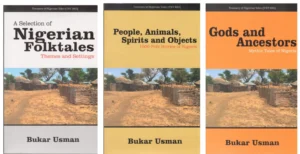
Q.: As someone familiar with Dr. Usman’s fascinating publications, what do you believe is his most significant contribution to Nigerian literature, and how has it impacted the Nigerian or African literary community?
A.: Definitely, it is his Treasury of Nigerian Tales in their many volumes and formats. Those works are timeless and will continue to regenerate literary thoughts and philosophies into the future.
Q.: Finally, how would you want Dr. Bukar Usman’s legacy to be remembered within the ANA circle?
A.: I believe ANA should do more work, maybe like a colloquium, conference or symposium on Dr. Usman. A future convention can focus on “Literature and Folklore,” with him as keynote speaker. ANA can do a funded workshop to train writers to develop pieces in all genres based on folktales collected by the Foundation. You can see how a writer can gain by staying close to Dr Usman in the way Henry Akubuiro wrote the play Yamtarawala from his insight into the history of Biu Kingdom, a place where Dr. Usman came from and which he has documented its history and folktales in many books.
ANA can also have in its Writers’ Village in Mpape, Abuja, a Centre or Depository for Nigerian Indigenous Literature where literary collections in various indigenous languages can be stored for users and researchers. We have had a number of notable writers in indigenous languages such as Abubakar Imam, D.O. Fagunwa, Pita Nwana, Afolabi Olambitan, Adebayo Faleti, Ado Ahmad Gidan Dabino, and many others. Their books and those of Dr. Usman could be stored in that kind of Centre. The idea of the Writers’ Village is to have a space to accommodate such kind of fancy which will not be provided for us elsewhere.
__
* The interview was conducted on August 13, 2024. Khalid Imam can be reached through his email: khalidimam2002@gmail.com


